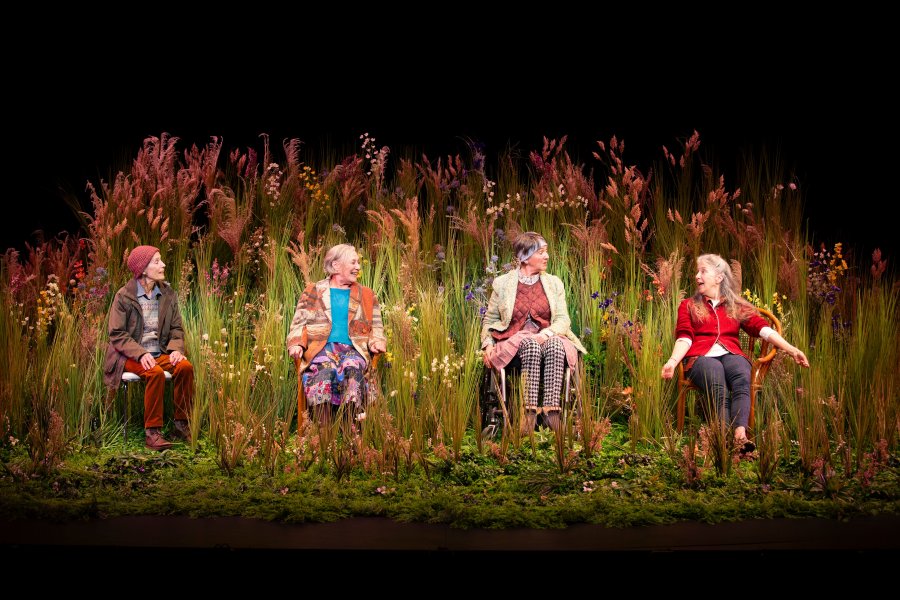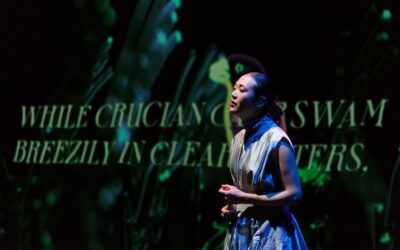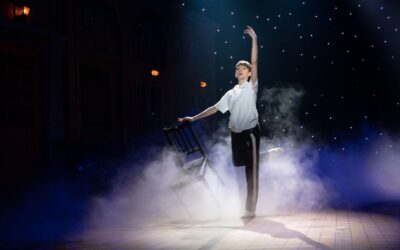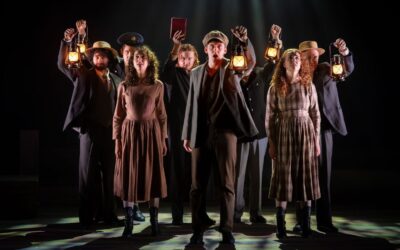By Adam Rafferty
Often described as Britain’s greatest living playwright, the brilliant Caryl Churchill is renowned for works that take unusual and experimental forms, while always being wondrously relatable. With more than 30 plays to choose from, companies who wish to bring her work to stage are spoiled for choice. In this instance, Melbourne Theatre Company Artistic Director Anne-Louise Sarks has chosen to put together two of Churchill’s one act plays in a combination not staged before.
The first of the two is Escaped Alone, a piece written specifically for four women over 70 years-of-age, meaning that the level of skill and experience demonstrated on stage is enormous. It focuses on Mrs Jarrett (Helen Morse), who while passing by a backyard fence, spies three women enjoying the warm weather and afternoon conversation in a garden gloriously overgrown with wildflowers. She’s invited to join the trio of Sally (Deidre Rubenstein), Lena (Kate Hood) and Vi (Debra Lawrance) as they reflect on their lives and share tales of the ordinary, such as an irrational fear of cats; and the far more extraordinary, such as mariticide.
Their stories are pleasantly amusing, and somewhat mundane, until Mrs Jarrett steps out of the scene occasionally via a shocking blackout and audio assault. This allows her to switch to addressing the audience directly with chronicles of a dystopian future, teetering on the edge of oblivion. In these bizarre addresses she tells of people living underground and trading mushrooms for urine. It’s disturbing in its content and shocking in its contrast. Will the other three seniors ever live to see her apocalyptic vision, or are they living blissfully unaware that their simple, yet full lives, are something to be cherished in the light of what might be to come?
What’s for certain is that it’s an absolute delight to live a few afternoons in this enchanting company, thanks to the virtuosity of the four actresses responsible for bringing the women to life. Marg Horwell’s grassy set is like a fifth character and seems to wave in the breeze as it grows charmingly while time evolves in the play. Jethro Woodward’s sound design eerily defines the juxtaposed time streams before the joy ride ends at a ‘leave them wanting more’ 45-minute duration.
After interval, in What If If Only, Horwell’s garden sits at the back of the stage outside the windows of a simple four roomed house, the home of ‘S’ (Alison Bell). Alone she goes about her life peeling and eating half a boiled egg, before putting it away again, exhibiting a languid contemplation. After the passing of some time – demonstrated by Paul Jackson’s skilled lighting design – she speaks to the room and we discover that she is mourning the loss of a partner, overwrought and not knowing how to go on with her life without her loved one in it. An immensely relatable demonstration of loss is performed with heart-breaking certainty by Bell, her pain utterly understood.

Then suddenly she is visited by the ghostly apparition of a woman, not her partner, but the representation of a future that may or may not be possible for her. Then a man, and another woman and over a dozen different people (all unnamed) visit ‘S’, evoking lost dreams and ambitions and showering her in an overwhelming verbal assault.
Churchill’s script doesn’t specify the genders, nor number of ghosts that appear to ‘S’, allowing Sarks to spread out the text and give the opportunity of being involved to a wonderfully diverse range of actors, including the four leading ladies from Act One. However, the sheer numbers swamp the six-page script and 25-minute playing time. As identifiable as the scenario may be, and as beautifully as Bell may play a woman in grief, the insubstantial volume of the story makes it more of a theatrical exercise the likes of which one might see in a drama school production, than a professional work worthy of balancing out the one act play before it into a full price two act production.
The result is an intellectually intriguing hour and a half (with interval) at the theatre, that sadly leaves you craving something more satisfying.
Images: Pia Johnson





